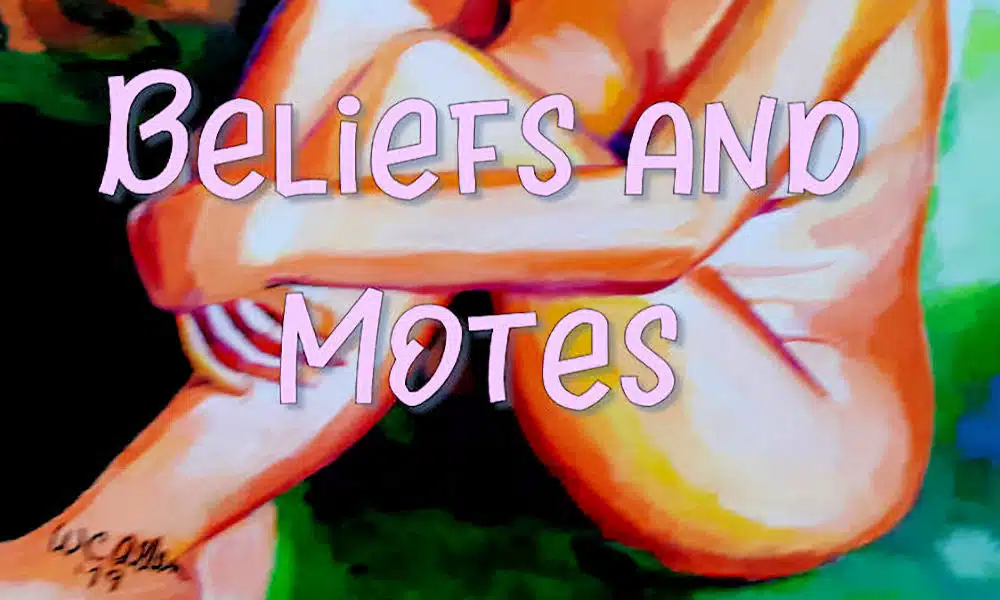Beliefs and Motes — There is no objective reality. Everything is filtered through our beliefs. Knowing that can make a difference

Want to learn more about living a full and meaningful life?
Want to have the best relationship ever?
Check out my books

Today, I want to mention a quote from Tom Robbins’ Fierce Invalids Home from Hot Climates.
I’ve always loved a good turn of phrase and Robbins’ writing abounds with them. Plus, I love the underlying philosophy.
In the book, Switters is the protagonist, and at one point is talking with a nun. He goes off on a segue about what’s wrong with the world. He declares that all of the world’s problems are the result of what he calls the “killer B’s.”
His “B” list goes on for some length — bombs, beheadings, bloodshed, etc. His point, however, is this — the two banes of existence are Belief and Belonging.
Switters is quite aware of the connection between belief and belonging — which in turn is based upon socialization. Socialization is the process of teaching infants and children “the rules” — and those rules are all about fitting in to one’s tribe.
It’s true that belief and belonging lead to behaving.
Before I retired, I seldom if ever saw clients who had true mental illnesses. What I did see were people caught in a crisis of meaning — whose beliefs and need to belong had led them far down a path of inauthenticity and false bonding.
As we move further into the 21st century, what is surfacing is abject fear. Some of the fear is based upon the nightly news — The endless regurgitation of Trumpism, climate destruction, etc.
There’s an internal sense of both dread and deadness.
“There must be something wrong with me. I’m following all the rules, being a good person… and I’m unhappy and sick and tired and lost. This is not how it’s supposed to be.”
The fear is, “The world is going to end, and I’m going to die unfulfilled.” And the truth of it is, this is so… unless you are willing to let go of the beliefs, the behaviours and the belonging.
No wonder it’s scary.
I continue to amaze myself with the cross-generational interference I see.
- Parents who continue to manipulate their grown children… trying to get them to behave, to follow the rules, to be the perfect son or daughter. This despite the fact that the grown children have lives of their own… and are emphatically not there to fulfill the parents’ needs. EVER.
- Or grown children trying to get mom and dad to behave differently, to treat them differently, despite the fact that they’ve been treated this way all their lives. They’re unable to let go of the illusion of belonging to a perfect family — despite knowing nothing is perfect about good old mom and dad.
- Or spouses desperately trying to manipulate their partner into behaving. Guilting, blaming, cajoling, or playing the “I have your best interests at heart” game.
As opposed to letting go.
We really need to loosen our grip on the rules, the regulations, the rigidities we have all been subjected to. All of which begins with an understanding that nothing is “real”… nothing is “true”… for all time and in all places.
Beliefs, behaviours, belonging — social conventions — nothing real, nothing true, about any of it.
Most people choose to stay stuck and wallow in self-pity, occasionally seeing a therapist for just enough “support” to maintain their beliefs, without challenging or letting go of any of them.
Rare is the person who, having been stuck for decades, suddenly decides to drop the drama and to become simple. To simply let go. To simply begin living life in the moment. To choose behaviours and beliefs based upon utility rather than on habit, coercion or fear.
This letting go of the “should-be’s” is initially traumatic — then suddenly freeing.
Something else crossed my desk — it was a line in an e‑zine I subscribe to. It’s for writers. There was a lovely line that contained a mistype.
The author likes to go on at length about the deeds of her offspring — paragraph after paragraph of “family news” before we get to the writing stuff. I usually skip past it. For some odd reason, my eye got hooked, and I found a gem.
Anyway, she was writing about a trip to the beach with her kids, and about how they were building sand castles. Complete with a moat. Except what she wrote was that the kids had built a “giant mote.”
I about snorted coffee out my nose.
I suspect that “mote” is not a common word any more. It’s Old English, and means “speck,” or “a tiny amount of anything.” So, according to her expression, “giant mote,” we get a “huge speck.”
Or, perhaps a giant mote is “making a mountain out of a molehill.”
I imagined two kids with tiny shovels, digging minuscule holes in the sand and screaming “look at the size of that one!” (Apparently, even in childhood, size matters… 😉 ) Drama, drama everywhere, and no one notices its “mote-ness.”
We train ’em young, we do. As if anything short of dying is irreversible. As if making things big and important actually has relevance. As if making myself important means I actually am important, as opposed to a caricature of a real human being.
As if “my drama is bigger than yours” is a “good thing.”
One of the joys in my life is how good I’m getting at noticing when I’m being dramatic, and making “giant motes.” Ram Dass called losing the drama “Nobody Special Training.” Which flies in the face of our cultural beliefs, behaviours and belonging-ness.
Rather than building giant motes, or even giant moats, perhaps we should simply learn to doff our pretenses, drop the shit we’re shovelling, and have a roll in the sand. Maybe, from a rules and roles perspective, it’s all about nothing. Maybe instead of digging a hole, I can “dig” being whole.
In the end, life is about passion, not behaving. It’s about relating, not belonging. And it’s about who I am and how I choose to interact with the world — not about blindly following the beliefs that mommy and daddy and society taught me.
